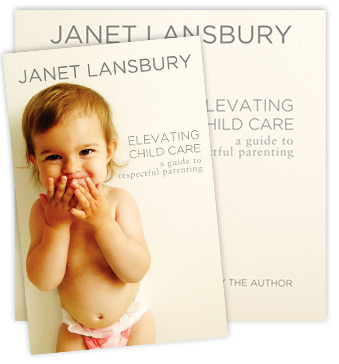Parents are often reluctant to set limits for children because they’d rather not face the push-back and negative reactions (can’t imagine why). We don’t feel good when our kids are unhappy, and it feels even worse when we’re responsible for it. We might feel guilty, worrying that our children’s disappointment or anger will linger, or fearing they will feel unloved or stop loving us because we didn’t let them do what they wanted.
Nothing could be further from the truth.
Providing boundaries with honesty and respect is the surest way to foster emotional security, which will endow our children with a lifetime of happiness and freedom.
Stephanie shared an experience that brilliantly illustrates this truth and exemplifies three essential ingredients for successful, respectful discipline:
1. Respectful communication
We intervene with even our youngest infants directly and honestly rather than resorting to distraction, tricks, coaxing or other types of disconnected, dishonest responses and manipulation.
2. Setting limits early
We register our annoyance before it turns to frustration or anger and realize that this is a sign that we need to set a limit. Since we know it’s patently unfair to allow our negative feelings to infringe upon our relationship with our child, we perceive these limits as positive and loving.
3. Following through
We recognize that our verbal directions and requests are often not enough, even when our children fully understand them. So we assure children that we will “help” them by confidently following through with gentle but insistent actions.
Stephanie’s story:
“I wanted to write and tell you about an interaction with my 2 year old daughter last night. I had come home from work and while I was talking with my husband she began to dump the clean clothes from the laundry basket onto the floor. At first I was not going to set a boundary because it was not really a safety issue, but then I felt myself getting annoyed so I decided that it would be better to go ahead and stop her from dragging clean clothes over the dirt on the floor.
I crouched down to her level and said, “I won’t let you drag the clothes across the floor. I don’t want to have to wash them again.” I gently removed the clothes from her hands and she tried one more time to grab them from me and I softly deflected her hands away and said, “I won’t let you take them from me. I am putting them away.” She cried for about 10 seconds and quickly went on to play with her kitchen set.
As much as I believe in respectful parenting it for some reason still amazes me when I have an interaction like that. The communication just seems so effortless and authentic and I love the peace it brings to my home.
A short while later, and this is the best part, Genevieve came in close to me and gave me a hug. Then she said the most heartwarming thing to me….”I am so happy. I am so happy, Mama.” And she meant it!
Boundaries help our children to feel safe and happy. Thank you for all your help in guiding parents to set them with love.”
***
I offer a complete guide to understanding and addressing common behavior issues in my book:
NO BAD KIDS: Toddler Discipline Without Shame
Thanks to Stephanie and Genevieve for allowing me to share your inspiring experience!
(Photo by Phillippe Put on Flickr)















My son sometimes cries when I enforce a limit… But just as often he laughs! I have to be careful not to let it turn into a game.
The trickiest limits are the ones that I’m not entirely capable of enforcing. Example: we have a floor lamp in a corner of the play room. It was secured at two points to the wall, and, because there was no overhead lighting, the lamp was necessary. Up until a few months ago, it was secure enough, but at some point, Ender realized 1. The lamp moves if you shake it and 2. I didn’t want him to do that. So it turned into a game pretty quickly, because no matter how many times I stopped him, going back was the funniest new trick ever.
Fortunately, we were able to add a couple more tethers before I lost my mind, and now it’s not a safety (or nuisance) issue. Since I don’t bother to keep him away from the lamp any more, naturally he’s no longer interested.
I observed that limits are a great way for children to communicate things to us.
Adrien has understood that some things are forbidden in the house : draging some of our furniture on the floor for instance. When he thinks I’m not taking enough care of him because I’m working on the computer, he goes right to the forbiden thing. He knows I’m going to react.
Yesterday I told him “Well, you think I’m not playing enough with you so you went there to get some attention. But you know you cannot do that. Come here with me”. He left what he was doing and came smiling.
Sometimes he goes from one forbiden spot to the other looking if I’m following.
I think there is no problem if he litteraly plays with limits. And sometimes he is right, he has played alone for some time and enough is enough…
Enforcement is difficult at the beggining but when he knows what he can and cannot do, it becomes part of his world and he can respect the rule, or use it as any part of his environnement.
Sounds like you read that situation very well, Laurence, and your boundary was “come here”.
My hope is that parents can begin to perceive all boundaries positively. Sometimes our child will comply happily and other times feelings will emerge that might be hard for us to hear, but these feelings are extremely healthy for our child to express. Then through our honesty and acceptance we can both move on together as Genevieve and Stephanie did.
This reminds me of a great metaphor of limit testing I read recently… I don’t THINK it was on this blog, but I’m not sure. The author compared toddlers testing limits to a person blindfolded in a room. The first thing the person will do of course is reach out to find the wall (limit). And of course the person will continue to reach out and touch the wall, to make sure it is where he/she thinks, to make sure it’s really a wall and not furniture or something, and because knowing where to find the wall is comforting if you can’t see anything.
So when my toddler laughs at pushing a limit, he’s not doing it because he likes being “bad.” He’s doing it because he’s happy to have found the wall.
And yes, also because sometimes he just wants my attention, as you say. 🙂
Hi Meagan! I’m glad you secured the lamp (a boundary of sorts), for your own peace of mind and your boy’s safety. Yes, it makes perfect sense that he has no interest in testing there anymore… 🙂 Just want to mention that when we do find ourselves in these situations, I recommend a “ho-hum stride” and staying very calm, relaxed, bored about the whole thing (like I shared in my recent post: https://www.janetlansbury.com/2013/01/5-reasons-toddlers-wont-follow-our-directions/ ). These are only fun games for children if we are stirred…and they sense that a mile away! So a bit of acting helps… “Acting as if” will make us feel more confident, too.
Yes, I know, but easier said than done!
Like Meagan, I’m curious about how one goes about setting limits in matters that one cannot easily physically enforce. I find it pretty straightforward to give my three-year-old daughter the option to get in the tub, or I will help her get into the tub. But what happens, say, when I ask her to clean up, or open her mouth for medicine, and she refuses? I prefer to stay away from punishments and rewards and generally feel this works well for us. But I do find that there are certain areas where it is much harder to follow through with an action that will enforce the boundary I would like to set, and those are the areas where I find myself getting more annoyed and impatient than I like to be. Often my response is to remove myself from the situation (so I do not become overly annoyed), and my daughter ends up complying after I’ve gone because she doesn’t like it that I’ve gone to another room. But I think that does feel to her like punishment, even though I’m doing it to keep myself on an even keel rather than to wring compliance out of her. I’d rather find some other ways….
Margarita, the situations you describe definitely take a bit more finesse. My first “go-to” would be finding a way to offer autonomy. “Please tell me when you’re ready to open your mouth for the medicine.” Or, “What kind of “chaser” would you like? Orange or Cranberry juice?”
I’m going to admit right now that I’ve never been great at getting my kids to clean up, but you might offer a honest consequence like, “I’m looking forward to having a snack together, but I can’t get the snacks until we’ve cleaned this up. Please show me where you want your dolls to be kept”.
I also think leaving the room is fine if you do it with a statement like, “Please let me know when you’re ready to clean up your playroom with me. I’ll be doing some things in my room.” Then it is not a punishment, but an honest response that reflects a personal boundary. This is far better than blowing up.
Thanks, Janet. Thinking more about ways of offering autonomy is helpful!
Janet, I would be even more honest and say, “I feel as if I’m going to blow up. I’m going to leave the room so that I can calm down. I’ll be back in a few minutes.” By expressing how I am feeling, I’ll be on my way to feel better and the likelihood of me actually blowing up will be reduced. I think this honest sharing of feelings will also foster my child’s emotional intelligence. Not that that’s the agenda here by any means.
Good point, Gauri, but what I am suggesting is quite different. I urge parents to give children (and themselves) these kinds of boundaries WAY BEFORE they feel like blowing up. We get to the point of blowing up because we are not setting a clear boundary early enough…and taking care of our relationship with our child the way Stephanie did so beautifully in this story.
I couldn’t agree more with you. Not getting to the blowing up stage is always ideal. And thanks for pointing that out. If and those rare instances when we do get there, complete honesty might be the next best thing.
Yes! Honesty and directness with children is always best.
A lot of what you recommend in your post and in the comments makes good sense. However, asking the child to set the timeline and tell the parent where things belong is the sort of approach that causes children to feel unsafe subconsciously. They wonder, “How am I supposed to know?” We raised our kids in the US until they were 13 and 16, then we moved to Central Europe. Parents here aren’t afraid of their kids. They just tell them what to do, the kids do it, and life goes on. It’s much simpler. Twenty years ago I’d have read my own comment here and thought I was oversimplifying childrearing, but now I firmly believe that unless you have a special needs child, the best thing you can do for your child is tell them what to do and expect them to listen. Kids here are FAR better behaved than in the US.
I think Laurence’s comment is spot on, and I wonder if Genevieve was throwing the clothes on the floor in order to get her mother’s attention; she says she’d just come home from work and was talking to her husband.
Often I find that as well as enforcing a limit I need to address the underlying need, otherwise my child will just go find something else to gain my attention, or keep on at the same boundary.
Jo, I find it curious that you would second-guess this experience when it could not have been more successful and positive for all concerned. Quite honestly, the kind of self-questioning and over-thinking you are suggesting is often the reason parents end up neglecting boundaries and then find themselves yelling.
Yes, more is always revealed after the boundary is set…and in Genevieve and Stephanie’s case, the result made it clear that the situation was handled perfectly. Genevieve got the assurance she needed that her mom cared enough to gently stop her and that her momentary feelings of displeasure about this boundary were acceptable. These are almost always the “needs” that are first on the child’s list. Then, when this particular kind of “attention” has been taken care of, more needs might be revealed. But when children repeat these behaviors, it is usually because we have not been calm, clear and decisive…
Janet, I am so sorry, I think my comment has come across all wrong, and that’s entirely my fault! I certainly didn’t mean to suggest that Genevieve’s needs were not being met. As you say, the successful outcome speaks for itself. I merely wanted to underline the observation made first by Laurence that limits are a great way for children to communicate things to us. I was not questioning Stephanie’s awareness of this, just mentioning it as something I feel is always important.
I do think that seeking to understand the underlying need behind a behaviour is absolutely paramount in empathetic parenting, and I don’t think that by doing this we are over-thinking or self-questioning.
No worries, Jo! And thank you for clarifying… In regard to these underlying needs, I’ve worked with hundreds of parents, Jo, and this issue can completely do them in. They get frozen with doubt, second-guess themselves and give a hesitant, weak or inadequate response, which creates more problems. Laurence recognized the kind of boundary her boy needed after he repeated this behavior (and because she realized he’d been playing for a long time on his own). Yes, there are often underlying needs parents should try to be aware of and after the boundary is given is a good time to ponder them, but not when the parent is feeling annoyed or triggered.
any suggestions on what to do when it’s someone else’s toddler pushing mine around? my daughter is 20 months old and Im not sure what to say to her insofar as her understanding me,I don’t want her thinking it’s ok for someone to do this to her
I’d like help with this too. Especially in a playground situation, I don’t feel comfortable physically stopping an unknown child, and I never know how to respond, either to the child pushing (etc), or to my son.
Jude and Meagan, I would definitely not allow anyone to push, hit, knock, kick or otherwise hurt your child. Toddlers this age need us to be attentive when they are socializing and when there is the slightest concern about a child’s behavior (either ours or another child’s) we need to stay close and be ready to calmly, but insistently intervene. I would place my hand between the children and say evenly and briefly, “I won’t let you push.” Then I might ask the child who was pushing, “Were you trying to play with Billy? Please find another way.” Or, “Was Billy in your way? Billy, can you move over a bit, so this boy can pass by you?”
Maintaining a neutral tone is very important, because only then do the children have an opportunity to problem-solve and learn from this experience. If we take sides, lecture, etc., children tend to start identifying as victims or aggressors…which is not helpful to either child. When we over-intervene, we teach children that they can’t possibly handle these situations. So, BE there, but only to keep the children safe and perhaps offer a suggestion for another way to communicate.
I have a 2.5year old and we co-sleep. He has since day one resisted sleep and we have to be quite serious regarding our bedtime rituals. We read four books before bedtime and then turn out the lights. Recently, he has decided he wants to lay on top of mommy or kick mommy once the lights go off. My husband gently is now saying, “I will not let you kick/lay on mommy” and I say “I don’t like that you do that” and “I don’t want you to lay on my body”. We have told him that if he can’t control himself Daddy will need to hold him still. Which he has now needed to do for the past week or so. I should probably also mention I am 32 weeks pregnant. Are we doing the right thing? If we continue to be consistent will he eventually get sick of the fight?! Thanks Janet in advance!!! Your advice is always so helpful and insightful!!!
Kelsey, it sounds to me like your boy needs to express some of his fear about your pregnancy, which I would try to encourage him to do several times a day. “Is the idea of the baby coming bothering you? Most kids have lots of feelings about new babies…Kids feel worried, upset, unsure, all kinds of things.” Even if he does not respond, know that you are reassuring him that his feelings are normal and acceptable to you.
I would be much more proactive generally. Rather than repeating the obvious to him about the kicking, ask him right after the books if he feels like he needs Daddy to hold him tonight (not as a punishment, but to help him with his out-of-control feelings and impulses). If he says no, but then tries to get on top of you or kick you, stop him immediately and have Daddy calmly, but insistently hold him. “You didn’t think you needed our help with this tonight, but then you did.” Does he cry when Dad does this? If so, remember that this is a very healthy release for him.
By being proactive and immediate with these actions, you will project to your boy the confidence he may not be sensing from you right now. When children are going through heavy transitions like this one, they need even more “nesting”, meaning a reining-in of his behavior, but with LOTS of acknowledgements of his feelings. Your little guy needs to know that his leaders are very competent and not disturbed or thrown by his behavior. Does that make sense?
Yes!!! I have felt that the action is so bizarre and habiitual that is was an expression of something deeper but couldn’t quite wrap my brain around it. Yes, he cries when Daddy holds him and he reaches for me saying “I want mommy” and “mommy I need you.” He then after the struggle will always snuggle up with me. I love the idea of the strong acknowledgement of his feelings during this transition. I guess I felt like my pregnancy wasn’t throwing him off like it is or throwing us off either;-)
As a teacher I can tell almost immediately, how my pupils were parented.
Do they have respect?
Are they patient?
Are they kind?
Do they expect a framework to guide them with class behavior?
Do they disregard the teacher’s expectation, become the class clown,
Decide to not do homework, chores etc.
Yes the teacher can always tell, and some years there were not enough corners for the un parented child.
Thank you so much for sharing my story, Janet! I always love reading the responses as well. It was brought up that there may have been an underlying need for Genevieve to have my attention and I agree with that. I have a routine when I come home and I always greet her and give her my full attention when I come in…a hug, a kiss (if she wants), and then she tells me some select events about her day. I have a need to take care of myself when I get home after working for 12 hours as psychiatric nurse and caring for the chronic persistently mentally ill. I am aware of my needs to change into my pajamas and “download” some of the stressful parts of my day with my husband. I let Genevieve know that verbally by saying something like, “Let me get comfortable and then I will give you my full attention.” Sometimes she chooses to nurse for a couple minutes, but most often she chooses to wait until bedtime. After that I either sit nearby and chat with my husband while she plays OR if she is inviting me to play then I do that with my full attention. I know that I would be impatient and distracted if I did not care for myself first. I want her to have my FULL attention and I can only give that while caring for myself first. When she was a young baby I put her needs first (eg. nursing because she was hungry when I came home). Now that she is 2 I know she can understand and respect my needs. Just wanted to clarify that.
Stephanie, I love, love, love the understanding you have of your personal needs and the honest, respectful way you are taking care of them, while also honoring those of your daughter. I wish more parents realized that it is THIS kind of relationship that makes children truly and deeply happy with us…and with life.
Stephanie, I am so sorry I have only just come back to this post to read these comments, and I am mortified to think that my comment may have made you feel you need to clarify your awareness of your daughter’s needs and the amount of attention you give her. I did not mean to question this at all! My comment has come across all wrong, which is entirely due to my own clumsiness, and I do apologise! I was merely trying to add another element, to make the observation that the behaviour is often communicating something. I did not think for a minute that you would be unaware of this, nor was I questioning your response, which, as Janet says, was clearly very successful.
How interesting that I came on here to see if you had anything about adult interactions (you don’t 🙂 ) but this can be applied as well for grown up issues.
As I am learning more about myself in the journey of parenting, I am finding that I have issues setting boundaries for myself, and I am getting pushback from friends who are accustomed to the old me. I’m not mad at them because it’s how they know me, but I need to make changes and grow.
While I am not ‘disciplining’ them, this article shows how to be authentic with people, something we as women weren’t taught. I think we are taught to always smooth things over, present a happy face and smile while inside we are seething. After years and years of that you don’t even know your own inner voice.
I really don’t want that for my daughter.
I apologize for the off topic ramble 🙂
Thanks for the article, you made my day. Keep writing, you are blessing and changing the lives of people and future generations !
I love off-topic rambles… Thanks for your kind words! Danielle, I can relate to your struggle. I am finally becoming good at personal boundaries with friends and relatives because of what Magda Gerber and my children have taught me. Parenting can be extremely therapeutic if we approach it with high awareness and the wisdom of an amazing adviser like Magda Gerber.
Regarding authenticity and “presenting a happy face when you’re seething”, here’s a post that I think you would like: https://www.janetlansbury.com/2011/09/the-happiest-kids-dont-have-to-smile/
Cheers!
Janet
I have a similar story: one afternoon my 2 year old daughter was banging her spoon on the table while we had snack. I told her to stop, which she did–but then she started gently tapping her spoon on the table–slowly getting louder and louder. I was feeling annoyed and having a complicated inner dialogue about when tapping became banging and whether I should say something or just ignore the behavior. Then I thought of the advice I’ve read on this website and realized that if *I* wasn’t sure when tapping became banging, my 2 year old wasn’t either! So I asked her, “do you want me to tell you what you can and can’t do with the spoon?” Her nervous, fidgety energy disappeared and she said “yes!” Now she regularly asks for me to tell her the “can do rules” and “can’t do rules”. She clearly loves the order that they bring to her world–though she’s still a toddler, so sometimes when she’s doing something she knows she shouldn’t, she’ll say “mama, don’t tell rules!” Even so, it’s become a great frame for things, a simple way to provide guidance and a reminder to me of the importance of giving her clear boundaries–especially when I’m feeling frustrated.
I love this story, Mary! Yes, children just want to know the rules… They don’t perceive rules and boundaries as negative things, even when they DO complain or cry about them. I wish parents would perceive all boundaries as the gifts that they are. These are gifts that are very hard for us to give sometimes, but our children absolutely appreciate them.
Janet,
I’m struggling with how to set a particular boundary for my 23 month old daughter. There are times when she completely refuses to get into her car seat. Sometimes I can wait until she is ready, and I will nurse her, which is what she usually asks for, and then put her in. Other times I don’t have time to wait, as we would be late for our intended destination. I find myself resorting to bribing with snacks, and in extreme cases, when nothing else works, I have to forcefully put her in her seat (which isn’t easy, as she is very strong). It kills me to have to do this. Any suggestions?
Hi Julie! I realize how not fun it is to have to force your child into a car seat, but sometimes this is necessary. Here’s a post I wrote on the subject: https://www.janetlansbury.com/2012/01/car-seat-tantrums-handled-with-respect/
This is so helpful. I always overanalyze these situations!
Great post as always Janet! I have a similar comment to one above. My son is 33 months and also will go from one thing to the next to see my response. This is when I am doing something that he wants to take my attention away from such as being on the phone, working on the computer etc… He will touch all the buttons on the cable box, find the phone and dial numbers, do all sorts of things that he knows are “off limits”. Normally he doesn’t do any of these things.
It is challenging because obviously if I’m on the phone when he is awake it is not because I have made the phone call, as I save all those calls for when he is napping.. these calls are those that have been made to me, so often I need to take them. Also, any work I am doing when he is awake, is also work I need to do. I may just need to put up baby gates, or make areas inaccessible, do you think this is the best move to make? We haven’t really done that in our new home, as he doesn’t do these things on a regular basis and is usually very responsive when we set a limit with him.
Also he will start throwing his toys, and keep upping what he’s doing to get my attention, so it isn’t just “touching” buttons on things I could move out of his play area…hmm.
Thanks for any input! It is always great appreciated!
Deb
awesome!
Hi there! I was led to your site by a sweet friend of mine and I am loving it. I am having extreme difficult time with my 2 year old. He is such a sweet little strong willed boy, but he is hitting. Alot. I have tried what I know to do like redirecting, time-ins, and nothing seems to phase him. I do not believe in spanking, but I have started to lose my patience with him and started yelling a him because I am so desperate for him to stop. Probably very counteractive in this situation. He has been very rough with his sitters little girl who is also 2. I think it may be becasuse he has been having trouble with his speech. He uses some words, but is a bit delayed. He is using more and more words every day, but not 3-4 word sentences I hear other kiddos use his age. My husband thinks we need to take a harsher direction with him, and I will not! I know there has to be something else we can do. anytime his sitter puts him in a time out he will happily go and sit in his spot and jsut smile. No protest and when he is done sometimes just go back to the same behavior that got him there. He seems to do this with his brother 4 too at home just doesn’t seem to be as much. Please help!
I have a lot of difficulty enforcing limits with my daughter (now almost 18 months). She is very strong willed, and as mentioned above by some, there seems to be no middle ground between her laughing as though it’s a game and her crying because it’s too harsh. I’ve tried being sensitive and communicating as though she understands my words and is capable of accepting them. When she doesn’t listen I repeat them and try to stand firm. But the pattern I’ve found is not like the stories in your post .. Instead she will repeat the unwanted action over and over in defiance and there seems to be no end to her stubbornness. It often reaches the point of absurdity in terms of how long I spend trying to get her to comply. I’m not sure where the happy medium is in this situation.
As a background, I’ve tried from the beginning to be responsive and to meet her needs, and so far she is still very clingy and demanding (of my time and attention in particular, while generally being very happy and independent for long periods of time when taken care of by others). Any wisdom would be appreciated:)
Hi!
I am having a difficult time with my son, soon to be 2 year old. He has a very strong will. When he has decided that he wants to do something its difficult to change his mind. Like when he wants to unplug/replug the electrical devices. Even if we tell him paciently that we cannot let him do that because it can be dangerous, he either gets very angry, or he smiles and says “no no” and runs off. Its not long before he tries again. Sometimes he waits for us to be occupied with something. He sometimes tries not to have eye contact when we speak to him and suddently says he want to do some colouring etc. He also likes to hit the load speakers. Same behavior. He recently started to hit us, sometimes in anger and sometime for fun. When he does it for fun he usually gives us a hug afterwards. But then he hits again and then a hug again. Should I reject his hug and say that I feel sad that he hits me? Or should I just continue what I do. He does not seem to listen to us… I dont now what to do sometimes. Do you have any advice for us?
Janet,
I’m curious as to how we should handle our most recent barrier.
Our daughter, she’s one, recently had a major abdominal surgery. As such, we are having trouble with meal times. She is refusing many foods she once enjoyed and has started throwing food.
Her mom and I are patient but aren’t sure the best way to handle this?
Thanks,
Machin
The way this goes with my almost-2-year-old:
‘I won’t let you dump clean laundry.’
*Child punches me in the face.
‘Son, I won’t allow you to hit.’
*Child punches harder.
‘I understand you’re frustrated because you wanted to play with the laundry but I cannot allow you to hit.’
*Child screams, ANGRY! and bites down hard on my arm.
*I rip child off my arm.
*Child swings at me scratching my face.
*I freak out because now I am in pain, I have ten bruises on my arm and scratch marks all over my face from all the times this interaction occurs.
*Desperate, I resort to time-out.
*Baby cries, I feel guilty for giving him time-out.
With respect, Elizabeth, you sound like a victim to your tiny child. How are you not able to prevent a less than 2 year old from hurting you? Be ready for this behavior and calmly stop him.
I have been feeling depressed lately and felt like my relationship with my daughter was deteriorating because I didn’t know how to parent her. It felt like being a meanie to her not granting all her wishes. But when I was carrying her to wherever she was pointing to, I had a very similar experience as Stephanie – I was telling myself this was not right. Yes, I was afraid to face her meltdowns whenever I said no and I was afraid she would love me less.
In the beginning, when I thought about discipline and parenting, I was reminded how even the abused children still loved their parents, which is so sad but testimony to their ability to love so deeply. So I was prepared to be a loving but firm parent. But that was before I had a baby! When you have this person who fills your heart so full with love, it’s so easy to forget the perspective and affirmation that setting limits are important for them.
Thank you Janet and others for continuously writing these wisdom to encourage and remind me why I need to do this and why it will grow our love not diminish it.
Hi! I just found your site a few weeks ago and follow you on facebook. I really like this approach to parenting, but I have no idea how to backtrack out of what we have been doing. 🙁 I feel pretty bad about something actually. Should I start with your book and then ask for a consult if I am still lost? I have a 9 month old and want to change my ways soon as everything I have read so far is spot on to how I want to interact with my baby, I just don’t know how to start. (Is there a how to get started page?)
My current challenge is helping my 3.5 year old toddler. As most of his challenging behaviours occur when I am nursing or putting his 6 month old sister to sleep. Therefore I have to constantly interrupt her down time to address his behaviours, and she will not get the needed rest she needs. Any strategies to address this would be great thank you.
Hello Janet,
My 2 year old daughter I guess started her toddler life, she started to throw tantrums anywhere and she will cry and scream for 1/2 an hour if she don’t get what she want, or if her Dad try to stop her from something like not using her soother during the day, it will really upset her and she will cry out loud and nothing can ever stop her.
It is becoming a problem between my partner and I because we are not used to crying, my daughtet has been really easy and independent all along. It is affecting our relationship to the point that we realized we are not on the same page on parenting her. He is very strict and firm, he can stand putting her time off and let her cry for long time. I would say I am very soft, permissive and dont wanna deal with her crying so either I talk to her calmly eventhough she would scream at me, or divert/distract her from being upset by asking her staffs that she want to do instead.
My partner thinks that I am making him the bad guy in our daughter’s eye by simply not following what he is doing on disciplining her.
Please enlighten me Janet, I know I can never be tough as him. It breaks my heart seeing my daughter desperately crying. Yet at the same time I dont want my relationship with my partner be affected. Thank you.
Regards,
Ivy